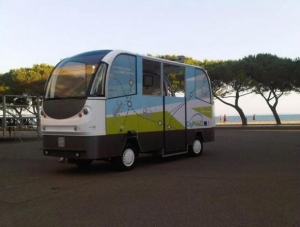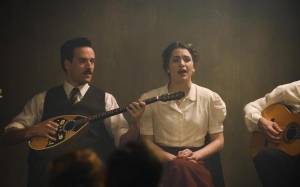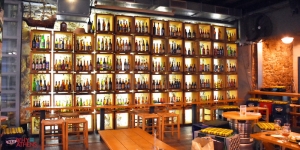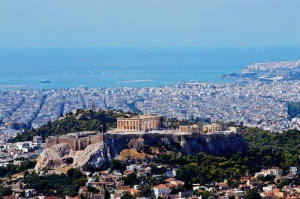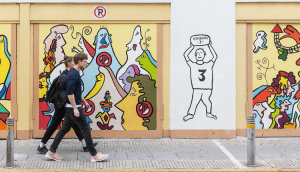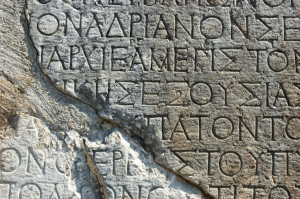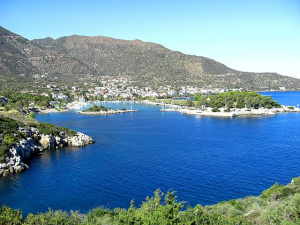BUSINESS CENTRE
XpatAthens
Trikala Is First Of Five European Cities To Launch Driverless Bus
The initiative is the combined effort of the CityMobil2 Program, a multi-stakeholder project co-funded by the EU’s Seventh Framework Program for Research and Technological Development.
This small futuristic vehicle will make a 2.4 km route on a daily basis from Tuesday to Sunday, from 10:00 to 14:00 and then again from 16:00 to 20:00. The first six days of its operation (until September 17), the bus circulated the city of Trikala without carrying any passengers. Passengers were welcomed to join the experience starting on Friday September 18.
Built by French manufacturer Robosoft, the buses are electric, silent and non-polluting. They are 5 meters long, 1.5 meters wide, carry 10-12 people, and do not exceed 20 km/h. The vehicles are equipped with an advanced GPS and a laser mapping system for localization and movement control. Laser and ultrasound technologies are used to detect obstacles in front of and around the bus.
Similar automated road transport systems are expected to be implemented in a number of urban environments across Europe.
Music From The Movie 'Ouzeri Tsitsanis'
To read this article in full, please visit: OMILO
Barley Cargo
Where: 6 Kolokotroni St.
Telephone: 210 323 0445
Opening Hours: Open Monday through Saturday from 11:00 to 03:00 and Sunday from 19:00 to 03:00.
Best Places To Photograph The Acropolis
Did Someone Say Sushi?
Enjoy the city's most impressive panoramic views and choose among a variety of sushi like maki, nigiri, sashimi and ceviche in a cozy and relaxing atmosphere.
See you there!
Oman Air Connects Athens and Muscat
Oman Air, the national carrier of the Sultanate of Oman, recently began its new daily route between Athens and Muscat, on Sunday, June 2.
The flight is the only non-stop service between Greece and Oman and is expected to benefit both business and leisure travelers, as well as the Greek community in Oman.
Through Oman Air's hub, the new service offers seamless connections to the airline's other destinations.
To read this article in full, please visit: Greek Travel Pages
Christmas Tree Illumination At Hotel Grande Bretagne
Learn more about the Hotel Grande Bretagne, here.
Walk With An Athenian
Thousands visit Athens every day, but few get the chance to experience Athens like a local. Meet our community of locals and follow in their footsteps, discovering hidden treasures and places of interest. What do Athenians do in their spare time, and how do they balance their careers and personal lives? When and where do they go out? A community of savvy Athenians will answer all your questions and help you navigate the city. People of diverse backgrounds offer their perspective on what makes Athens so irresistible and unique.
Choose a themed walk with a local and get to know Athens as an insider. Experience the real Athenian lifestyle and explore the places you won't find in any tourist guides.
Here are some of our favourite "This is Athens with a Local" walks:
Surf Athens With A Local
Athens is a city of contradictions, where the past meets the present in imperfect harmony. Beyond the famous ancient monuments, there is a modern metropolis that's easy to discover on foot. A local will show you how it really feels to live in Athens, by exploring their favourite haunts and unravelling the hidden secrets of this ever-changing city.
Explore Athens Architecture With A Local
Understand the evolution of Athens through its architecture, with the help of a local insider. Scattered all over the Greek capital are ruins, monuments and landmarks that reveal many layers of history. From elaborate government buildings to Byzantine churches, Bauhaus apartments and contemporary landmarks, the architecture of Athens reveals fascinating stories of migration and gentrification.
Check Out LGBT+ Athens With A Local
Athens is often hailed as the birthplace of democracy, but it was also the birthplace of gay culture. Openly practiced and celebrated, homosexuality was part of the social fabric of ancient Athens. Today, the Greek capital remains a very gay-friendly city, with countless gay and lesbian bars, many openly gay celebrities, and a vibrant LGBT+ community. Your local will introduce you to the LGBT+ scene, including cafes, bars, and beaches, as well as suggestions for drag shows and nightlife.
To read more, please visit This is Athens
Whether you've just arrived in town – or have been here for years – Athens always has new secrets to share! This is Athens is the official guide to this captivating city of ancient energies and booming urban culture. Compiled by a team of specialist local writers, This is Athens brings you an authentic and intimate portrait of a living Athens beyond the guidebooks – along with daily curated listings of all the best events and great weekend inspiration all-year round. From must-know neighbourhoods and emerging art hubs, to gourmet hotspots, cool shopping and the buzziest bars, This is Athens will help you to get the most out of living in Athens!
Thank you This is Athens for your contribution as an XpatAthens Partner.
Lose Your Fear Of Speaking Greek
“If you talk to a man in a language he understands, that goes to his head. If you talk to him in his language, that goes to his heart.” ― Nelson Mandela
A. Learn with a Greek friend or try lessons with a Greek teacher close to your home or online. You don't need to spend years learning Greek. Instead, you can use simple sentences and limited vocabulary which you use on a daily basis in Greece. The friendly reactions and comments from Greeks, impressed by your effort to learn their language, will motivate you to continue learning more.
B. Try the “Greek Speaking Starter Kit” an online multi-media starter kit, made by the Omilo Greek Language School.
C. Learn Greek by yourself. Learning a language on your own, without a teacher, is fun, but, keep in mind, that it can be full of difficult moments and delay the entire process by many years.

Masaresi.com was founded by Maya Cornelissens-Andreadi, who shares her experience about how “to integrate in Greece and feel like a local”. Masaresi = μας αρέσει = we like it! Discover the “real Greece," while delving into all the aspects of Greek life – from modern lifestyle and culture to history, literature, traditions, and many more.
Explore Greece - Read About Greece - Buy Greek - Learn Greek
New York Times Recommend A Greek Destination For 2023
At the top of its list of proposed destinations for 2023 is London, with the NYT noting that the bustling city is preparing for the coronation of King Charles.
The American newspaper in its list chooses destinations that are ideal for their cuisine, culture, for adventure or thanks to their natural beauty.
Regarding our country for the New York Times, Methana is one of the places one should visit in 2023, which ranks 39th on the list.
"Athens’s nearest active volcano, Methana, sits on a peninsula of the same name some 30 miles southwest of the Greek capital. Though largely unknown to tourists, the area is slowly evolving, in part because of its increasing popularity as a hiking destination.
"In recent years, groups of locals have managed to reopen and map old walking paths, some of which date back to the Mycenaean Era, creating hiking trails that attract visitors from around the world. (So far, more than 18 miles have been cleared and marked.)
"The Methana Volcano Challenge, first organized in 2021, offers a trail run across the peninsula’s sloping landscape.
"Visitors to this volcanic peninsula can also enjoy several hot springs, the most interesting of which is an ancient (and recently renovated) tub known as the Pausanias Baths near the village of Agios Nikolaos."


